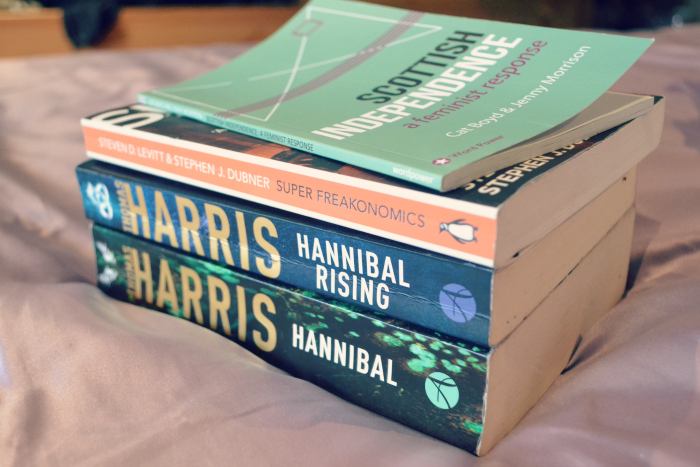
Since I fit the stereotype of a bookworm - introverted, fond of accurate spelling, a writer/blogger, have close friends who love to read - people regularly assume it's a hobby I partake in, but I actually don't read all that often. In fact, according to my GoodReads account, I only read four books during 2014.
I made a goal back in 2013 that I would read the books that have been on Amazon wishlist since forever (and in some cases 'forever' means 2007). 2013 and 2014 weren't years when I sat down with many books but so far in 2015 I've already read two books and I'm firmly making my way through a third. No bad. But before get to those books (which will be fun to review, one of them is about a girl who can't orgasm...) let's have a little look at the books I did flick through in 2014.
Scottish Independence: A Feminist Response
First off, we have a book that wasn't on my to-read list but given it was about the Scottish referendum it made sense to push it to the top of the list and get it read before the 18th of September. I am a bit wary of reviewing this as every review I've read so far has been glowing and I feel as though I'm going to cast myself out of the internet when I say I didn't like it (even though I voted yes and consider myself a feminist). The reason pretty much boils down to: it wasn't well backed up, which is something I consider essential when writing a book designed to persuade people (remember persuasive essays in English?). About two chapters in I spotted that the authors weren't referencing their sources at all (e.g. "95 percent of women" but with no source or "a study found that" without naming the study). I even flicked to the back to see if there was a bibliography - nope. A lot of the ideas and concepts in the book were new to me and good sources would have 1) helped convince me of their argument and 2) allowed me to go perform further research (and become more convinced!). I wasn't expecting the Harvard Reference System...just a quick "a study in 1985 by John smith" (instead of 'a study') would have sufficed. (I was only a mild yes at the time of reading and this book didn't help budge me towards the strong yes I eventually became).
Superfreakonomics
Second up, we have the prequel to Freakonomics: a book I ordered off Amazon during my first year university along with other books I thought would help me wrap my head around economics. Turns out it wasn't about inflation or currency conversation but instead discusses how abortion lowered the crime rate in NYC, rather than Rudy Giuliani (who was mayor at the time) with numerical data to back it up (because that's what economists do). It didn't help with my course but it was bloody funny. In Superfreakonomics there was a chapter dedicated to how high-class hookers operate including pricing and how much of a share the pimps took (which I found fascinating). There however was also a chapter on science (mainly environmental) but science hurts my brain and I was quite glad to leave that chapter behind. Depends on the chapter really, but if you're a sociology nerd then I'd pick this up.
Hannibal and Hannibal Rising
Finally, we have Hannibal and Hannibal Rising, which I'm knocking together cause they're part of the same series. I love the films and Hannibal Lector is my favourite film villain, but I didn't like the other two books in the series and these two were no different (yep, the film was better...same goes for you Green Mile). I had read Red Dragon and Silence of the Lambs before so knew I was in for a long read, but I wanted them off my list. The books are big and this is because the author adds in every single detail about everything: Clarice's curtains, so the shape of women's breasts, to how Barney walks and it's not needed. And about women's breasts - there's a scene where Barney takes a shower and he just gets in, washes, gets out. Then Margot gets in and we have a full description of how the water drips off her body...it's a common theme in the book that the female characters are physically describe in detail (including sexual appeal) but we only know the hair colour of most male characters. /feminist rant.
How many books did you read in 2014? It was no doubt more than me!
Morag x
